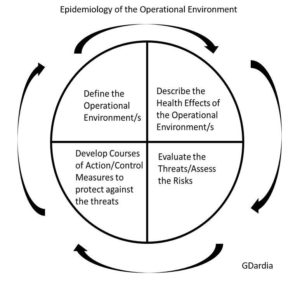by Geoffrey Dardia
This article was originally published as part of the SOF Health Initiatives Program at the Task Force Dagger Foundation and is reposted here with the permission of the original author.
_____
Introduction
America’s Armed Forces have been relentlessly fighting in the Global War on Terrorism for over 17 years. Our service men and women have been and continue to deploy into the most hostile, austere, polluted areas of the world. Because of this endeavor, Traumatic Brain Injuries (TBIs), suicides, cancer and other “undiagnosed” or “hidden injuries” are plaguing Department of Defense (DOD) service members and their families. The causes of these “unexplained illnesses” are not “unexplained” or “hidden.” The causes of these illnesses are the result of being overexposed to the stressors from our environment that we work and live in.
These exposures include, but are not limited to: Stress, sleep deprivation, dive injuries, jump injuries, blasts, pollutants (heavy metals/dust/smog/burn pits/industrial waste/chemical weapons), climate, Radio Frequencies (RF, jammers/radar/radios), processed and refined foods, prescription drugs, injuries, infections, and other conditions related to poor lifestyle choices. These endless wars have contributed to hundreds of thousands of injuries and unprecedented exposures to these stressors that have resulted in the worst epidemic of suicide, cancer and TBI in our country’s history.
The environment in which service members work and live in is the greatest influencing factor of health and is widely overlooked. A new framework of medicine is available right now that focuses on three primary influencing factors of health; environmental, lifestyle and genetic factors. Functional Medicine seeks to “identify and address the root causes of disease, and views the body as one integrated system, not a collection of independent organs divided up by medical specialties. It treats the whole system, not just the symptoms.” Health care providers can preserve the force by understanding the operational environment and Functional Medicine provides the solution.

Mental Health
Post-Traumatic Stress Disorder (PTSD), suicide and TBI are all downstream effects of broken upstream mechanisms throughout the body resulting from injuries and illnesses related to occupational/deployment related exposures. TBI, suicide and PTSD are not all cut and dry diseases. Service members might have similar clusters of symptoms, but the pathophysiology of each individual service member’s condition will be different because of genetic, lifestyle and environmental factors unique to them along with their own unique injuries sustained during military service. Health care professionals need to stop looking at PTSD, suicide and TBI as diseases, disorders, or diagnostic codes. PTSD, suicide and TBI are all dysfunctions in the body and to treat and fix them, you need to find the underlying causes of illness and have an individualized treatment plan for each patient based on their bio individuality and their history of illnesses and injuries. Health care providers should have the knowledge to find health issues before they become catastrophic or career ending. Health Care professionals should also can do more than manage patient’s symptoms with prescription drugs after they are diagnosed with a mostly preventable, presumed, chronic illness.
The military has set the example and lead the way with trauma capabilities and development of new medical technology but has been severely lacking with a full understanding of the long-term impacts of chronic stress, chronic prescription drug use and chronic exposure to environmental toxins. DOD surgeons and combat medics have proven themselves to be the best in the world by saving countless lives in combat. The injuries and conditions killing service members and veterans at a far greater rate than combat deaths are not the life-threatening injuries seen in combat. Suicide and cancer are ending the lives of service members and veterans faster than all the ongoing conflicts worldwide.
TBI, PTSD, chronic stress, toxic exposures, metabolic related illnesses along with mental health issues are costing the Department of Defense (DOD) billions of dollars every year (7.7 B) in prescription drug costs related to metabolic diseases and mental health issues. More importantly, it is costing the lives of service members and veterans. Approximately 50% of veteran suicides are a result of prescription drug overdoses.

(continued on next page)
Buy Me A Coffee
The Havok Journal seeks to serve as a voice of the Veteran and First Responder communities through a focus on current affairs and articles of interest to the public in general, and the veteran community in particular. We strive to offer timely, current, and informative content, with the occasional piece focused on entertainment. We are continually expanding and striving to improve the readers’ experience.
© 2024 The Havok Journal
The Havok Journal welcomes re-posting of our original content as long as it is done in compliance with our Terms of Use.


